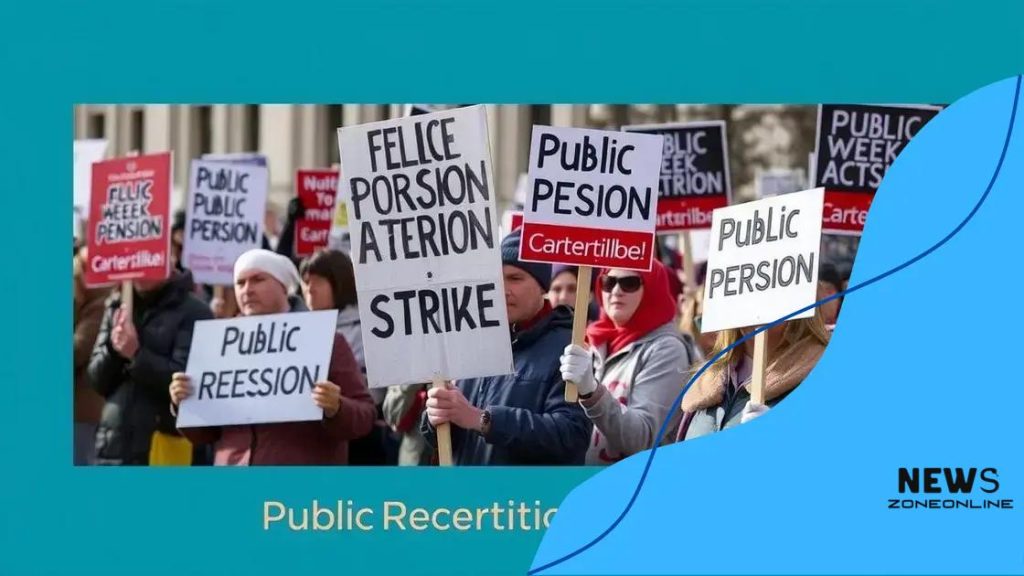Public pension strike updates: what you need to know

Public pension strikes are driven by demands for improved funding and benefits, reflecting the urgent need for reforms to protect the rights and futures of employees and retirees.
Public pension strike updates are important for understanding how these actions affect thousands of employees and retirees across the country. Curious about the implications and latest news? Let’s dive in.
Current status of public pension strikes
The current status of public pension strikes is significant as it affects many employees and retirees. With various groups advocating for fair wages and benefits, understanding their movements is essential. Strikes can disrupt services and highlight necessary changes in public pension systems.
Recent Actions Taken
Across the country, several public pension strikes have taken place. These actions often arise from grievances about funding and underfunded pensions. The heart of the matter revolves around the financial security of those who depend on these pensions.
- Increased workloads without adequate compensation
- Demands for better pension funding
- Denouncing cuts in benefits
- Advocating for equity and transparency
Many protestors are united by a common goal: to ensure that their public pensions are not only protected but also adequately funded. This is especially vital in today’s economic climate, where the cost of living continues to rise.
Responses from Authorities
In response to the strikes, officials have begun to engage in discussions with union leaders. There is an ongoing effort to address the issues raised by public pension workers. Solutions may involve legislative changes, increased funding, or restructuring of existing pension plans.
Open dialogues can lead to resolutions. However, for many workers, the urgency of their situation cannot be overstated. These strikes represent a critical moment in advocating for the security that public pensioners desperately need.
Transforming this situation requires understanding and action. As the strikes unfold, staying informed about their current status will help everyone involved grasp the implications for public pension systems.
Major impacts on employees and retirees
The major impacts on employees and retirees from public pension strikes are profound and far-reaching. These strikes are not just about wages; they encompass vital benefits that many rely on for their retirement.
Effects on Employee Morale
When employees strike, their morale can take a significant hit. The uncertainty surrounding their jobs and pensions can lead to anxiety and frustration. Strikes often arise from feelings of unfair treatment, and this can create a divide between employees and management.
- Loss of trust in employers
- Stress and anxiety about financial stability
- Unity among workers fighting for better conditions
- Heightened public awareness of employee issues
Moreover, the impact of a strike can affect not only the striking workers but also their families. Job security becomes a pressing concern, as does the ability to plan for the future.
Consequences for Retirees
For retirees, the implications of public pension strikes are especially concerning. Retirees often depend heavily on fixed benefits. If strikes lead to funding cuts, these individuals might find their pensions and livelihoods at risk.
The adjustments made during these strikes can influence how pension funds are managed in the long run. Decreased funding can mean reduced payouts for retirees. They may face challenges in covering basic living expenses such as housing, healthcare, and daily necessities.
Maintaining a stable pension system is crucial for the long-term well-being of all involved. As negotiations continue, understanding the potential outcomes for both employees and retirees is essential.
Recent developments and news

There have been many recent developments and news regarding public pension strikes that are crucial for understanding the ongoing situation. These updates highlight the complexities of pension systems and the dedication of employees advocating for their rights.
New Policies Under Discussion
In recent weeks, officials have proposed several new policies aimed at addressing the concerns raised by striking workers. These policies focus on improving funding and enhancing benefits for public pension plans.
- Increased state allocations for pension funds
- Revisions to existing benefit structures
- Proposed dialogues between unions and government
- Plans for public forums to discuss issues
Such measures aim to alleviate some of the stress that public pensioners face. As discussions progress, the fate of these proposals remains to be seen, but they reflect a growing awareness of the significance of pension stability.
Media Coverage and Public Response
The media has also been closely following the public pension strikes. Coverage has brought attention to the challenges faced by employees and the critical nature of their fight. Public support is crucial in these situations, as it helps raise awareness of the stakes involved.
As more people learn about the struggles of pension workers, they may feel inspired to join the conversation or offer support. Increased visibility can lead to greater pressure on lawmakers to take action.
Overall, the landscape of public pensions is changing rapidly. Staying informed about these recent developments is vital for understanding the broader implications for workers and retirees alike.
How to prepare for potential changes
Preparing for potential changes in public pension systems is essential for both employees and retirees. As strikes and negotiations evolve, understanding how to adapt is important for financial security and peace of mind.
Stay Informed
The first step is to stay updated on the latest news and developments. Regularly check reputable news sources, union announcements, and government communications. Keeping abreast of changes helps you anticipate what may come next.
- Subscribe to newsletters from labor unions
- Follow trusted news outlets for updates
- Join community groups discussing pension issues
- Attend public meetings or forums about pensions
Being well-informed allows you to make better decisions about your future as well as advocate effectively for your rights.
Review Financial Plans
It’s crucial to review your financial plans periodically. Consider assessing your savings and pension information to see how changes might affect your retirement. Having a clear understanding of your financial situation will prepare you for any shifts that may arise.
Updating your plan can provide a clearer picture, especially if your pension benefits are at stake. Evaluate your investments and consider diversifying them to ensure a secure financial future.
Also, it may be worthwhile to consult with a financial advisor. They can help you navigate complex changes and adapt your strategies accordingly.
Adjusting your financial plan proactively puts you in a stronger position to handle uncertainties. By preparing now, you can reduce stress and ensure long-term stability.
Voices from the frontlines of the strike
Hearing the voices from the frontlines of the strike provides a deeper understanding of the struggles and motivations behind these public pension protests. Striking workers are often passionate advocates for their rights, and their stories reveal the human element of this issue.
Direct Testimonials
Many employees share their firsthand experiences. They highlight personal sacrifices and the emotional toll that strikes take. Each voice tells a unique story, emphasizing unity in the fight for fair treatment.
- Striker Jane Smith said, “I’m standing up for my future. My pension means everything to me and my family.”
- John Doe, a retired teacher, remarked, “I’ve worked hard all my life. I deserve to retire with dignity and security.”
- Emily Johnson stated, “This is not just about money; it’s about respect for the work we do every day.”
- Mark Brown expressed, “We are demanding transparency and accountability in how our pensions are managed.”
These voices resonate with both colleagues and the public, drawing attention to the importance of collective action. They remind us that behind every strike are individuals fighting for their futures and their communities.
Community Support
Community support plays a vital role in empowering strikers. Messages of solidarity from families, friends, and local organizations boost morale. Events organized to support the strike help raise awareness and bring people together for a common cause.
As these voices ring out, they create a powerful narrative that captures the essence of the struggle. Every story motivates others to join in, amplifying their message for justice and fair treatment in public pensions.
Ultimately, it is the voices from the frontlines that continue to drive the conversation and push for essential reforms.
In conclusion, the ongoing public pension strikes highlight the urgent need for reforms and fair treatment of employees and retirees. The struggles faced by those on the frontlines remind us that these issues are not just numbers on a page, but real lives affected by policy decisions. As we listen to their voices, it’s clear that unity and informed action can lead to meaningful change. Staying updated and prepared will empower everyone involved to advocate for secure and equitable public pensions.
FAQ – Public Pension Strike Insights
What are the main reasons for public pension strikes?
Public pension strikes often arise from demands for better funding, improved benefits, and fair treatment for employees and retirees.
How can I stay informed about public pension issues?
You can stay informed by subscribing to newsletters from labor unions, following reputable news sources, or attending public meetings focused on pension topics.
Why is community support important during strikes?
Community support raises awareness of the issues at stake, boosts morale among strikers, and encourages more people to advocate for essential reforms.
How can retirees prepare for changes in their pension plans?
Retirees should review their financial plans, stay informed about developments, and consider seeking advice from financial professionals to navigate potential changes.





